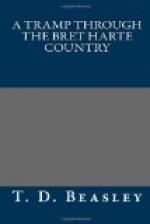Chapter IX
Bayard Taylor and the California of Forty-Nine. Bret Harte and His Literary Pioneer Contemporaries.
And here in old Marysville, the county seat of Yuba County and situated on its extreme western boundary, I ended my tramp, having covered a distance of approximately two hundred and fifty miles, exclusive of retracements. The ideal time to visit the Sierra foot-hills would be in the late Spring or early Autumn. I was compelled to grasp the opportunity when it offered or forego the pleasure altogether. Nor is it necessary, of course, to walk; the roads, whilst generally speaking not classed as good going for automobiles, are at least passable. I was surprised at the number of high grade machines in evidence, in all the towns of importance mentioned in this narrative. There remains also the alternative of a good saddle horse, or, better still, a light wagon with camping outfit, thus rendering hotels unnecessary, the elimination of which would probably pay the hire of horse and wagon.
Half a century is a long period. You could probably count on the fingers of one hand persons now living in the Sierra foot-hills who have any recollection of ever having seen Bret Harte. It must also be remembered that in the fifties his reputation as an author had not been established. Of all that group of brilliant young men who visited the mines in early days, which included for a brief space “Orpheus C. Kerr” and “Artemus Ward,” I can well imagine that Bret Harte attracted the least attention. It is extremely doubtful to “my mind if he ever had much actual experience of the mining camps. To a man of his vivid imagination, a mere suggestion afforded a plot for a story; even the Laird’s Toreadors, it will be recalled, were commercially successful when purely imaginary; he only failed when he subsequently studied the real thing in Spain.
Bret Harte was a man who in a primitive community might well escape notice. In appearance, manner and training, he was the exact antithesis of Mark Twain. He was a student before he was a writer and possessed the student’s shy reserve. I can well imagine him, a slight boyish figure, flitting from camp to camp, wrapped in his own thoughts, keeping his own counsel. Yet he alone of that little band, unless you except Mark Twain, possessed the divine spark we call “genius.” Centuries after the names of all the rest are buried in oblivion, Bret Harte’s stories of the Argonauts in the mining towns of California will remain the classics they have already become.




